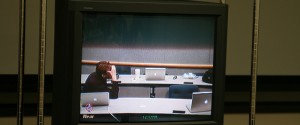The professional relationships between the owners and managers of a company will always be essential to business success, especially in the real estate industry. However, in the age of sophisticated communications technology, the face-to-face business meeting is used less and less for communication between business partners. The cost of teleconference and videoconference technology is cheaper than expenses and lost productivity from business travel. The individuals involved in the day-to-day operations of a business usually communicate by telephone, e-mail and text message without difficulty. Posing greater challenges are board of directors or shareholder meetings in a corporation or membership meetings in a limited liability company. Even in a closely held, non-public company, the owners or managers may be unfamiliar with one another. They may have a history of deadlock or hostility. The annual or special meetings of ownership and management groups of a company need to be able to produce legally valid resolutions in order to make the process effective and worthwhile. Even for small groups, in person gatherings usually result in greater communication for a host of reasons, including greater focus, observation of body language, convenient use of visual aids. While tablet computers and smart phones are invisible to the voices on the phone, the inattention may be palpable. An insightful business plan considers how the owners and management of the business will communicate with one another.
Legal Requirements. When considering remote-access meetings in a business plan, action requiring legally valid decisions of the owners or managers involves considerations in addition to logistics and leadership styles. Whether a company action is legally valid depends upon the type of business entity, its governing documents and the decision that is made. In Virginia, the two most common forms of business entity are limited liability companies and corporations. For Virginia corporations, the law places specific requirements on the use of telephonic and videoconference technology for participation in Shareholder or Director Meetings. For limited liability companies, the members have great flexibility in determining how their meetings will be conducted.
Corporate Director Meetings. Unless the organizational documents provide otherwise, directors may conduct meetings where they are not physically present in the same room but are able to listen and speak to one another at the same time.
Corporate Shareholder Meetings: The company’s organizational documents must specifically provide for remote participation before it can be implemented in shareholder meetings. Further, the corporation must adopt measures to verify the shareholder status of each participant, permit the shareholders to participate and vote. The meeting must otherwise be conducted as required by corporate law and the organizational documents. In a small, closely held corporation, adopting procedures for telephone meetings is unlikely to pose significant difficulty. As the number of shareholders increases, so do the challenges to conducting a remotely accessed meeting.
Shareholder Agreements: In many corporations, the shareholders enter into a shareholder agreement which may consciously set-aside the statutory meeting requirements. The guidelines for remote participation in shareholder meetings require consideration within the overall goals for the shareholder agreement, such as avoiding deadlock.
Limited Liability Companies: One of the advantages of a limited liability company is fewer legal impediments to running the company like a partnership. For LLC member and manager meetings, the members may set forth the manner in which members or managers may participate.
Practical Challenges to Communication: While Virginia law may impose certain requirements on conducting virtual meetings in order to make the proceedings effective, the real challenges are practical. Meeting by skype, webinar or teleconference can be frustrating. Presenters struggle to make a strong first impression if delays and glitches impede the human interaction. Participants may struggle to get through to a real person to resolve access problems. If some owners can access the meeting easily and others experience delay, these frustrations will start the meeting on a sour note. Leaders can minimize disruptions, by treating remotely accessed meetings with the same attention as in-person ones and adequate testing of the technology.
The purpose of the business meetings may carry with them special challenges to remote participation. If the meeting is to resolve deadlock, the inability to recognize gestures, eye contact and facial expressions may make remote participation ineffective. Where rival factions seek control of the company’s offices, control of the technology used for the meeting may be a source of conflict. Cash flow problems may make remote participation as contemplated in the bylaws impossible if IT bills aren’t paid.
Teleconference and videoconference are powerful can make participation in owners’ meetings convenient and effective. This may even make investment in the company more desirable to investors not active in the day-to-day operations of the company. In order to make such annual and special meetings productive and not a source of deadlock, the organizational documents must be drafted to make the means of participation in the meeting valid under the Virginia code and appropriate to the unique needs of the investor group, both at the initial organization and 5-10 years down the road. In my opinion, unless the owners and managers are spread out over different time zones, overcoming challenges and future success calls for being there in person.
photo credit: quinn.anya via photopin cc
- Words of Conveyance Blog is Moving! - September 30, 2021
- Condominium Bylaw Liability Waivers and Claims for Water Damage - August 12, 2021
- Can Zoning Enforcement Officials be Sued for Malicious Prosecution? - August 6, 2021
- Community Associations (68)
- Construction & Renovation (20)
- Consumer Protection (1)
- Estate Planning (3)
- Foreclosures (24)
- Foreign Assets (1)
- Fraud & Misrepresentation (14)
- Land Use & Zoning (7)
- Landlord-Tenant (12)
- Law & Film (4)
- Litigation (34)
- Local Governments (4)
- Property Inspections (7)
- Property Insurance (2)
- Real Estate Agents (7)
- Real Estate in Divorce (2)
- Recordation Taxes (1)
- Soft Skills (10)
- This Blog (3)
- Uncategorized (1)
